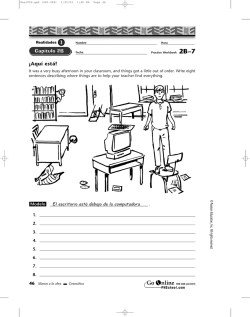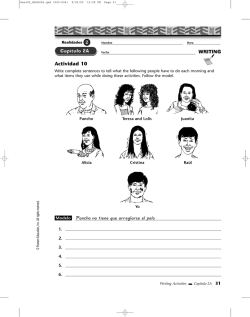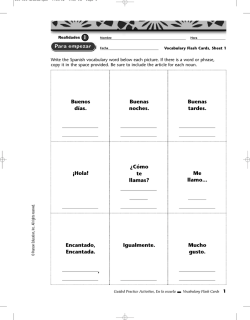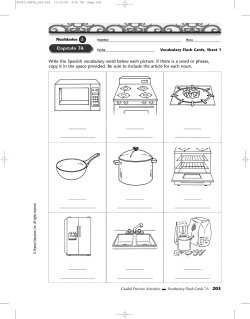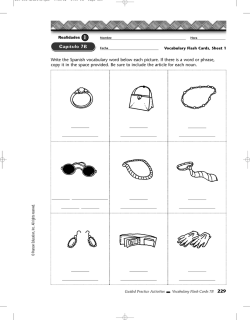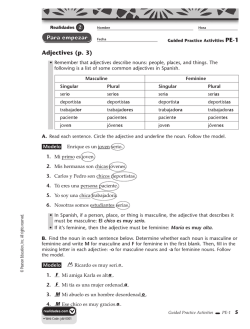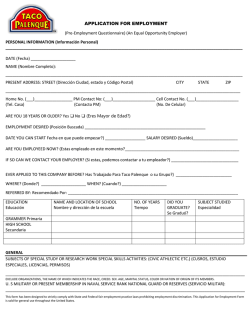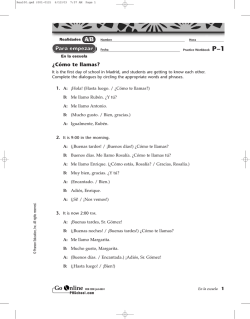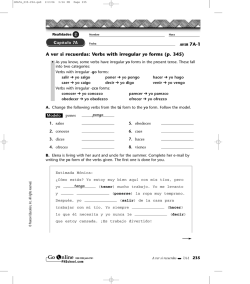
Write the Spanish vocabulary word or phrase below each picture. Be
GPA3A_90-107.qxd 2/2/06 3:28 PM Realidades Page 91 Nombre Fecha Hora Vocabulary Flash Cards, Sheet 1 © Pearson Education, Inc. All rights reserved. Write the Spanish vocabulary word or phrase below each picture. Be sure to include the article for each noun. Guided Practice Activities Vocabulary Flash Cards 3A 91 GPA3A_90-107.qxd 2/2/06 Realidades 3:28 PM Page 92 Nombre Fecha Hora Vocabulary Flash Cards, Sheet 2 Write the Spanish vocabulary word or phrase below each picture. Be sure to include the article for each noun. © Pearson Education, Inc. All rights reserved. 92 Guided Practice Activities Vocabulary Flash Cards 3A GPA3A_90-107.qxd 2/2/06 3:28 PM Realidades Page 93 Nombre Fecha Hora Vocabulary Flash Cards, Sheet 3 © Pearson Education, Inc. All rights reserved. Write the Spanish vocabulary word or phrase below each picture. Be sure to include the article for each noun. Guided Practice Activities Vocabulary Flash Cards 3A 93 GPA3A_90-107.qxd 2/2/06 Realidades 3:28 PM Page 94 Nombre Hora Vocabulary Flash Cards, Sheet 4 Fecha Write the Spanish vocabulary word below each picture. If there is a word or phrase, copy it in the space provided. Be sure to include the article for each noun. 94 Guided Practice Activities cobrar un cheque Vocabulary Flash Cards 3A sacar un libro © Pearson Education, Inc. All rights reserved. se me olvidó GPA3A_90-107.qxd 2/2/06 3:28 PM Page 95 Realidades Nombre Hora Vocabulary Flash Cards, Sheet 5 Fecha © Pearson Education, Inc. All rights reserved. Copy the word or phrase in the space provided. Be sure to include the article for each noun. caramba casi ¡Cómo no! en seguida hasta por pronto Hasta pronto. quedarse Guided Practice Activities Vocabulary Flash Cards 3A 95 GPA3A_90-107.qxd 2/2/06 3:28 PM Realidades Page 96 Nombre Hora Vocabulary Flash Cards, Sheet 6 Fecha Copy the word or phrase in the space provided. Be sure to include the article for each noun. These blank cards can be used to write and practice other Spanish vocabulary for the chapter. todavía varios, varias cerrar , la gasolina © Pearson Education, Inc. All rights reserved. 96 Guided Practice Activities Vocabulary Flash Cards 3A GPA3A_90-107.qxd 2/2/06 3:28 PM Page 97 Realidades Nombre Fecha Hora Vocabulary Check, Sheet 1 Tear out this page. Write the English words on the lines. Fold the paper along the dotted line to see the correct answers so you can check your work. la farmacia el supermercado el banco el centro la estación de servicio enviar el sello la tarjeta el buzón todavía © Pearson Education, Inc. All rights reserved. cerrar cuidar a devolver (un libro) Hasta pronto. ir a pie Fold In Guided Practice Activities Vocabulary Check 3A 97 GPA3A_90-107.qxd 2/2/06 Realidades 3:28 PM Page 98 Nombre Fecha Hora Vocabulary Check, Sheet 2 Tear out this page. Write the Spanish words on the lines. Fold the paper along the dotted line to see the correct answers so you can check your work. pharmacy supermarket bank downtown service station to send stamp card mailbox still to close © Pearson Education, Inc. All rights reserved. to take care of to return (a book) See you soon. to go on foot Fold In 98 Guided Practice Activities Vocabulary Check 3A GPA3A_90-107.qxd 2/2/06 3:28 PM Page 99 Realidades Nombre Fecha Hora Vocabulary Check, Sheet 3 Tear out this page. Write the English words on the lines. Fold the paper along the dotted line to see the correct answers so you can check your work. la carta echar una carta el correo el equipo deportivo el palo de golf los patines la pelota la raqueta de tenis el cepillo de dientes el champú el jabón © Pearson Education, Inc. All rights reserved. la pasta dental caramba casi Fold In Guided Practice Activities Vocabulary Check 3A 99 GPA3A_90-107.qxd 2/2/06 Realidades 3:28 PM Page 100 Nombre Hora Vocabulary Check, Sheet 4 Fecha Tear out this page. Write the Spanish words on the lines. Fold the paper along the dotted line to see the correct answers so you can check your work. letter to mail a letter post office sports equipment golf club skates ball tennis racket toothbrush shampoo soap toothpaste © Pearson Education, Inc. All rights reserved. good gracious almost 100 Guided Practice Activities Vocabulary Check 3A Fold In To hear a complete list of the vocabulary for this chapter, go to Disc 1, Track 5 on the guided Practice Audio CD or go to www.phschool.com and type in the Web Code jdd-0389. Then click on Repaso del capítulo. GPA3A_90-107.qxd 2/2/06 3:28 PM Page 101 Realidades Nombre Hora Fecha Guided Practice Activities 3A-1 Direct object pronouns (p. 138) • A direct object tells who or what receives the action of the verb. Direct objects may represent people or things. • To avoid repeating a direct object noun, you can replace it with a direct object pronoun. ¿Martín echó la carta ayer? (Carta is the direct object noun.) No, la echó hoy. (La is the direct object pronoun. It replaces the word carta.) • Here are the direct object pronouns you have already used: Singular Plural lo it, him, you (masculine formal) los them, you (masculine formal) la it, her, you (feminine formal) las them, you (feminine formal) A. Circle the direct object noun in each sentence. Then, write the direct object pronoun that replaces the circled words. Follow the model. Modelo Margarita cobró el cheque. lo 1. Paquito pasó la aspiradora ayer. 2. Juanucho buscó los patines. 3. Tú llenaste el tanque del coche. 4. Yo envié las tarjetas a la tía. © Pearson Education, Inc. All rights reserved. 5. Uds. sacaron los libros de la biblioteca. 6. Ella cerró la estación de servicio. B. Look at the sentences from exercise A. Replace the direct object noun you circled with the pronoun that corresponds to it. Follow the model. Modelo Margarita 1. Paquito lo pasó ayer. 2. Juanucho buscó. 3. Tú llenaste. 4. Yo envié a la tía. 5. Uds. 6. Ella cobró. sacaron de la biblioteca. cerró. WEB CODE jdd- 0304 Guided Practice Activities 3A-1 101 GPA3A_90-107.qxd 2/2/06 Realidades 3:28 PM Page 102 Nombre Hora Fecha Guided Practice Activities 3A-1a Direct object pronouns (continued ) C. Circle the direct object noun in each question. Then, answer each question by using a direct object pronoun in your answer. Use the verbs given. Follow the model. Modelo ¿Él cobró el cheque el martes pasado? Sí, lo cobró el martes pasado. 1. ¿Ella pasó la aspiradora ayer? Sí, ayer. 2. ¿Ellos arreglaron el cuarto esta semana? No, no semana. esta 3. ¿Quién echó la carta en el buzón? Anita en el buzón. 4. ¿Quién envió las tarjetas de cumpleaños? Billy . 5. ¿Ellas sacaron los libros de la biblioteca? Sí, bilbioteca. de la 6. ¿Jenny y Miguel cerraron la estación de servicio? No, no 7. ¿Él lavó los platos anoche? Sí, . anoche. • The direct object pronoun is placed before conjugated verbs. When an infinitive is present, the pronoun may come before the conjugated verb or attached to the infinitive. Lo tengo que hacer. or Tengo que hacerlo. Modelo ¿La raqueta? La voy a comprar mañana. ________________________________. Voy a comprarla mañana 1. ¿Las cartas? Las vamos a echar hoy. ________________________________. 2. ¿El palo de golf? Lo tengo que comprar. ________________________________. 3. ¿Los patines? Los vas a usar esta tarde. ________________________________. 4. ¿La mesa? La voy a poner hoy. ________________________________. 5. ¿Los periódicos? Los voy a separar esta noche. ________________________________. 6. ¿El dentista? Lo tengo que visitar hoy. 102 Guided Practice Activities 3A-1a ________________________________. WEB CODE jdd- 0304 © Pearson Education, Inc. All rights reserved. D. Rewrite the following sentences to show a second possibility for where the direct object pronouns can be placed. Follow the model. GPA3A_90-107.qxd 2/2/06 3:28 PM Page 103 Realidades Nombre Hora Fecha Guided Practice Activities 3A-2 Irregular preterite verbs: ir, ser (p. 140) • The preterite forms of ser (to be) and ir (to go) are the same. yo fui nosotros/nosotras fuimos tú fuiste vosotros/vosotras fuisteis usted/él/ella fue ustedes/ellos/ellas fueron • Usually the context of the verb is what makes the meaning clear: Mi doctora fue la Dra. Serrano. My doctor was Dr. Serrano. El año pasado fue muy difícil. Last year was very difficult. Yo fui a la farmacia. I went to the pharmacy. (If you see the preposition “a” following one of these verb forms, the verb is ir and the meaning is “went”.) A. Circle the correct conjugated verb in parentheses. ¡Hola Margarita! Ayer ( fuimos / fue ) un día muy interesante. Primero, mi familia y yo ( fuimos / fue ) al parque zoológico. Mis padres ( fueron / fue ) a ver los monos y mis hermanos y yo ( fueron / fuimos ) a comer un helado. ¡( Fuimos / Fue ) delicioso! A las cinco todos nosotros ( fueron / fuimos ) a comer en un restaurante argentino. La comida ( fui / fue ) © Pearson Education, Inc. All rights reserved. fantástica y yo ( fuiste / fui ) a la casa muy contenta. ¿Y tú? ¿Adónde ( fue / fuiste ) ayer? Un abrazo —Victoria WEB CODE jdd- 0305 Guided Practice Activities 3A-2 103 GPA3A_90-107.qxd 2/2/06 3:28 PM Realidades Page 104 Nombre Hora Fecha Guided Practice Activities 3A-3 Irregular preterite verbs: ir, ser (continued ) B. Write the correct form of the verb within parentheses. Follow the model. Modelo Rafael y Hernando no 1. Anoche yo (ir) al consultorio ayer. (ir) al centro. 2. Luego, Marcela y yo 3. La noche (ir) a cobrar un cheque. (ser) divertida. 4. Y tú ¿adónde (ir)? 5. La tarde 6. Ellos fueron (ser) aburrida. (ir) a un concierto en el parque. 7. El plato principal 8. Nosotras (ser) bistec y papas. (ir) a la playa. Irregular preterite verbs: hacer, tener, estar, poder (p. 142) • The preterite of the irregular verbs hacer (to do) and tener (to have) follow a similar pattern. yo tú usted/él/ella hice tuve hiciste tuviste hizo tuvo nosotros/nosotras vosotros/vosotras ustedes/ellos/ellas hicimos tuvimos hicisteis tuvisteis hicieron tuvieron 1. LAURA: ¿Qué ( hicieron / hizo ) tú y tu familia ayer? DANIEL: Nosotros ( tuvimos / tuvieron ) que ir al centro. 2. LAURA: ¿Qué ( hizo / hice ) tu papá? DANIEL: Él ( tuve / tuvo ) que enviar una carta. 3. LAURA: ¿Qué ( hiciste / hizo ) tu mamá? DANIEL: Ella ( tuvo / tuve ) que devolver un libro. 4. DANIEL: Y tú Laura, ¿qué ( hizo / hiciste ) en la noche? LAURA: Yo ( tuve / tuviste ) que cuidar a mi hermanito. 104 Guided Practice Activities 3A-3 WEB CODE jdd- 0306 © Pearson Education, Inc. All rights reserved. A. Complete the dialogue by circling the correct form of the verb within parentheses. The first one is done for you. GPA3A_90-107.qxd 2/2/06 3:28 PM Page 105 Realidades Nombre Hora Fecha Guided Practice Activities 3A-4 Irregular preterite verbs: hacer, tener, estar, poder (continued) • Like the verbs hacer and tener, the verbs estar (to be) and poder (to be able) are also irregular in the preterite. • Unlike regular preterite verbs, hacer, tener, estar, and poder do not have accent marks on their preterite forms. • Here are the preterite forms of estar and poder: yo tú usted/él/ella estuve estuviste estuvo nosotros/nosotras vosotros/vosotras ustedes/ellos/ellas estuvimos estuvisteis estuvieron yo tú usted/él/ella pude pudiste pudo nosotros/nosotras vosotros/vosotras ustedes/ellos/ellas pudimos pudisteis pudieron B. Write the missing endings of the preterite forms of estar and poder in the sentences below. 1. Ayer yo estuv en el parque por una hora. 2. Mi amigo Pablo no pud venir. 3. Pablo y su papá estuv en la oficina del doctor. 4. Después, Pablo no pud © Pearson Education, Inc. All rights reserved. 5. Él estuv 6. Tú estuv ir a la escuela. enfermo por tres días. enfermo también, ¿no? C. Complete the sentences below with the correct preterite form of the verb in parentheses. Follow the model. Modelo Yo hice (hacer) mucha tarea anoche. 1. El fin de semana pasado, yo 2. Mi hermano Tito Julio. 3. Tito casi no (estar) en casa. (tener) que hacer una tarjeta para nuestro tío, (poder) terminarla a tiempo. 4. Después, echó la tarjeta al buzón y por la noche, nosotros (hacer) la cena. 5. ¿Dónde (estar) Uds. el fin de semana? WEB CODE jdd- 0306 Guided Practice Activities 3A-4 105 GPA3A_90-107.qxd 2/2/06 Realidades 3:28 PM Page 106 Nombre Fecha Hora Guided Practice Activities 3A-5 Lectura: La unidad en la comunidad internacional (pp. 146–147) A. The reading in your textbook is about Ciudades Hermanas Internacional or the Sister Cities program. As you look at the reading, you will notice several headings. Headings are a way of organizing ideas in a reading. Look at the headings below from the reading to help you complete the following activity. Ciudades Hermanas Internacional ¡Quiero tener una ciudad hermana! Intercambio económico Intercambio cultural Intercambio educativo Now, write L (for Lectura) next to the sentence below if it is something you might find in the reading. Write N (for No) next to the sentence if it is something you might not find in the reading. 1. The Sister Cities International program is for sports teams. 2. The mission of the Sister Cities International program is exchange and cooperation. 3. The sister cities can have educational, economic, and cultural exchanges. 4. How to have a sister city. 5. Sister cities cannot be from different countries. B. Read the following excerpt from the reading in your textbook. Then, determine the important ideas of the excerpt and place a ✓ next to them. 1. It is difficult for people in the United States to find a sister city. 2. People in the United States can easily find a sister city. 3. Cities with the same names can become sister cities. 4. Cities that don’t celebrate the same festivals can become sister cities. 106 Guided Practice Activities 3A-5 WEB CODE jdd- 0307 © Pearson Education, Inc. All rights reserved. ¡Quiero tener una ciudad hermana! Cualquier (Any) ciudad en los Estados Unidos puede tener una ciudad hermana. Primero es necesario encontrar otra ciudad extranjera ( foreign). Esta ciudad puede tener alguna relación con la ciudad original. Por ejemplo, ciudades que tienen el mismo nombre, como Toledo, Ohio y Toledo, España, pueden asociarse. También, las ciudades que celebran el mismo festival pueden formar relaciones de hermandad. GPA3A_90-107.qxd 2/2/06 3:28 PM Page 107 Realidades Nombre Hora Fecha Guided Practice Activities 3A-6 Presentación oral (p. 149) Task: Pretend you need to prepare for a trip to Mérida, Mexico. You will visit some Mayan ruins and the beach in Cancún. Remember that it will be very hot and humid. A. Complete the following chart. Write Sí in the middle column, ¿Lo necesitas?, if you need the item, or No if you do not need the item. Then, place a ✓ in the right column, ¿Lo tienes?, if you already have the item. Ropa ¿Lo necesitas? ¿Lo tienes? pantalones cortos camisetas abrigo traje de baño sombrero para el sol botas cepillo de dientes B. Review your answers in part A. List three items that you need but that you already have at home. © Pearson Education, Inc. All rights reserved. 1. 2. 3. C. Pretend you already went shopping for the items you did not have. In the left column, list those items you had to buy for your trip. In the right column, write down where you bought them. The first one is done for you. Tuve que comprar... ¿Dónde? pantalones cortos el almacén D. Use the information in parts B and C to talk about your trip preparation. Tell what you need and what you have or don’t have. You may also bring in and show articles of clothing as props. You can use the following as a model. Para mi viaje a México necesito camisetas, pero ya las tengo. Tuve que comprar unos pantalones cortos en el almacén... Guided Practice Activities 3A-6 107
© Copyright 2026
